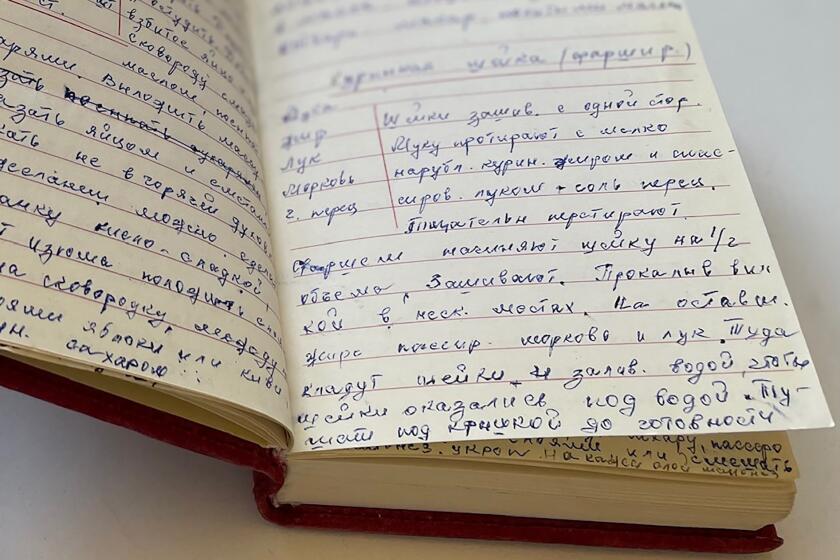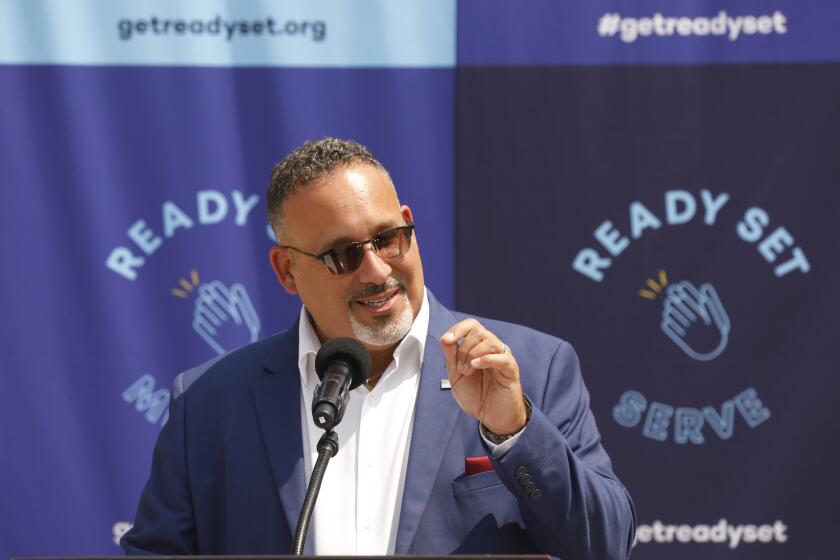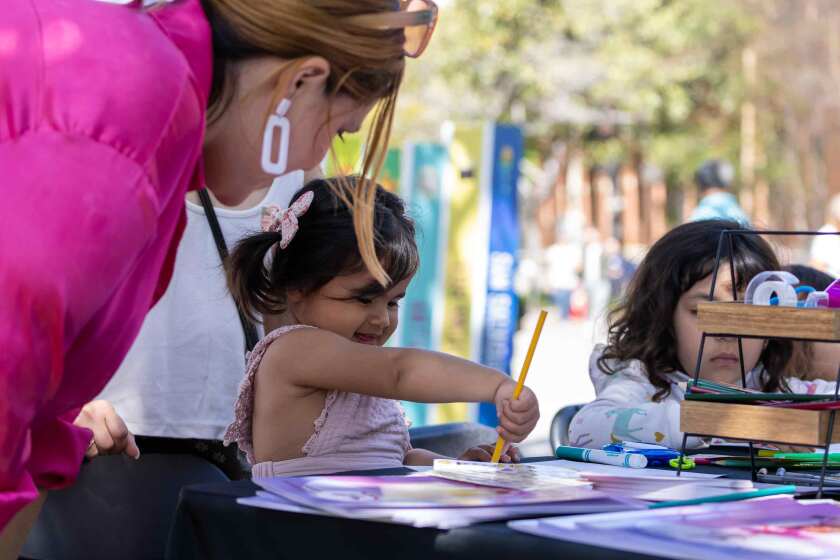Opinion: A lesson in how to teach your kids to speak Russian

- Share via
Having taught for nearly a decade, I’ve worked through my share of classroom challenges. Nothing, however, prepared me for the toughest one: teaching my own children to speak Russian, my native language, as well as English. They didn’t give a hoot about extra credit or Tootsie Pop bribes. They just weren’t that interested.
When they were babies, I diligently spoke and sang to them in Russian. But once they entered day care, everything changed. A barrier went up practically overnight. I’d pick them up with a jovial “How was your day, my bulochka?” — “bulochka” means “little pastry” — and each toddler, in turn, would hand me their lunchbox, look around to see if anyone was listening and whisper, “Speak English, Mommy!”
Was it because I wasn’t forcing my kids to speak in a certain way, unwilling to subject them to the steamrolling style of my own Soviet education? Was it because their father wasn’t fluent in my language, even though he’d promised to learn it when we were dating? (To be fair, I promised to learn to make Tater Tot casserole and that hasn’t happened either.)
A grandmother’s handwritten instructions for borscht, dumplings and stuffed chicken necks are recipes for resilience.
I felt lost and alone in my guilt. I wanted to raise my kids to be bilingual not for its cognitive perks — of which there are plenty — but because as an immigrant, I am the last guardian of my family’s tongue, straddling the old world and the new. Without the language and the history it holds, however complicated, I feared my children would never understand a vital part of my identity and theirs, never forge connections with relatives near and far.
I started reading, having honest conversations with other immigrant parents and, most of all, observing.
I found that there is no one-size-fits-all magic formula for raising bilingual kids. Children aren’t sponges, absorbing whatever they hear. Teaching a child to speak in a way that deviates from that of the playground, social media and school takes work and effort. Lots of work and effort. And the results will likely not be perfect. Kids (and adults) are capable of becoming bilingual at any age, but because bilinguals don’t use their languages in the same way and to the same degree, those who achieve truly equal fluency are like unicorns: They are rare.
What, then, does work?
Encouraging students to become multilingual is a major goal of U.S. Secretary of Education Miguel Cardona. What a nice change from the days when kids whose first language was not English were seen as problems.
First, I noticed that the more my children were exposed to the language at home and outside the home, and the more they needed to use it, the stronger their skills.
Our house has turned into a bastion of conversation, books, music and often ridiculous YouTube videos in my language. Outside our four walls, the key has been interacting with native speakers, such as their immigrant grandparents, baby-sitters and saleswomen at a Slavic grocery store where we buy beet salad and chocolate candy.
What’s also been helpful is seeking out cultural events and playdates where the little ones can trade silly jokes and Pokémon cards in Russian, making it seem less outlandish and weird.
What I can say for sure hasn’t worked is well-meaning advice and rigid rules. Pretend you’re deaf to English, some people suggested, that will teach ’em! Send ’em abroad to live with relatives for the summer! Divvy up the languages with the other parent and never deviate.
The latter is called the “one parent, one language” method, or OPOL, and this approach has many adherents. But it isn’t realistic for my family.
Encourage your bilingual baby to use multiple languages by talking, reading and singing with them. Human interaction will foster their bilingual learning.
For example, I can’t always speak in my language and alienate my partner. Sometimes I’m too tired to police my speech after a long workday. Nor can I leave my children with my parents all summer or jaunt off to the “old country” — Russia, Ukraine and Belarus — because of the Russian invasion.
Instead, I found it comes down to high-quality and high-quantity — if not wall-to-wall — exposure to the language.
I have also realized how fraught language is, how sensitive to prejudice. I’ve been forced to confront my own experience as an awkward 13-year-old refugee in California with barely any English skills. I still remember the chill of judgment, the colossal difference between me and my fluent, well-heeled classmates. At school, I began pretending I wasn’t an immigrant and spoke only English in public. Which isn’t dissimilar from what my tots would do in day care years later.
Finally, it has been liberating to turn down the voices of judgy relatives and former teachers in my head, the ones that cackle, “You call this bilingualism? You should talk to my hairdresser’s cousin Olga, now her son is a real prodigy, that boy!”
With my children now in elementary school, I realize that sustained curiosity about the family language is what matters, even if it sometimes takes a bribe. Whenever they read with their grandparents and talk to cousins overseas in our shared tongue, I marvel at the roots taking hold, and at how much they’ve already learned, instead of getting bogged down by perfection.
I’m finding that giving myself and my children credit for celebrating small wins rather than agonizing over milestones not yet met is half the battle.
Masha Rumer is the author of “Parenting with an Accent: How Immigrants Honor Their Heritage, Navigate Setbacks, and Chart New Paths for Their Children.”
More to Read
A cure for the common opinion
Get thought-provoking perspectives with our weekly newsletter.
You may occasionally receive promotional content from the Los Angeles Times.













